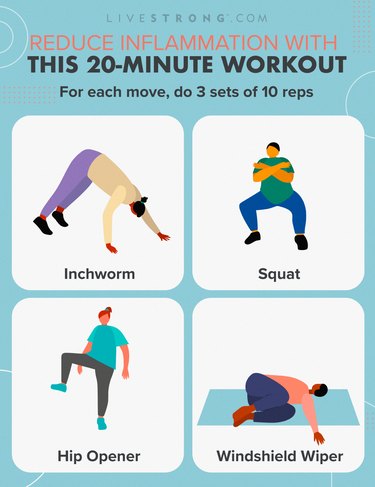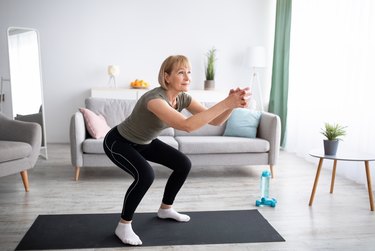

It's common knowledge that exercise has a heap of health benefits: It supports weight management, reduces stress, strengthens your heart, builds stronger bones and lowers your risk of certain diseases.
And now you can add decreases chronic inflammation to the list too. A small March 2017 study published in Brain, Behavior and Immunity found that 20 minutes of moderate-intensity exercise can boost the immune system, producing a cellular response that lowers inflammation levels.
Video of the Day
However, while brief bouts of moderate-intensity exercise have an anti-inflammatory effect, it's important not to overwork the body — for instance, doing HIIT training every day — because this will actually lead to a state of prolonged inflammation, says Sam Becourtney, DPT, CSCS, a New York-based physical therapist at Bespoke Treatments.
Try This 20-Minute Workout to Reduce Chronic Inflammation

This body-weight workout from Becourtney is ideal for reducing chronic inflammation because it focuses on strengthening the muscles and joints by moving them through their full ranges of motion. It also promotes better posture, reducing stress on joints throughout the body.
If you consistently perform this 20-minute routine multiple times a week (aim for three), you can make a real difference in decreasing your body's inflammatory processes, Becourtney says.
Tip
While exercise is extremely important, it’s only one piece to the larger puzzle of chronic inflammation. To effectively reduce chronic inflammation, you need to focus on many aspects of your lifestyle, such as getting enough quality sleep, reducing stress levels and consuming a diet high in nutrient-dense foods.
Move 1: Inchworm
- Start standing, then fold forward at your hips and reach your hands toward the floor.
- Keeping your legs as straight as possible, walk your hands forward until you're in a high plank with your shoulders over your wrists. Pause here for a moment.
- Still keeping your legs straight, walk your hands back toward your feet while pushing your butt up toward the ceiling.
- Stand back up before going into the next rep.
This is an excellent dynamic stretch for the hamstrings and lower back that also improves shoulder and hip stability, Becourtney says.
Move 2: Windshield Wiper
- Lie on your back and bend both knees with feet flat on the floor and arms out to the sides.
- Rock your knees in one direction while keeping your upper torso on the floor and pause for 3 seconds.
- Reverse the movement, rocking your knees back in the other direction and pause for 3 seconds. That's one rep.
This mobility exercise increases blood flow to the lower back and hips, Becourtney says.
Move 3: Hip Opener
- While standing, bend your left knee and lift it up as high as you can.
- Open your hip outward as far as you can to your side, then lower your foot down to the ground.
- Switch sides and perform with the opposite leg. That's one rep.
This dynamic move enhances hip mobility, helping counteract the negative effects of sitting most of the day, Becourtney says.
Move 4: Body-Weight Squat
- Stand with your hands across your chest and your feet hip-width apart.
- Keeping your torso upright, send your hips back and lower your butt down as if you were going to sit in a chair.
- Continue until your thighs are parallel to the floor or as low as you can comfortably go, then press your feet into the ground to stand back up.
“This fundamental movement pattern is necessary for many activities of daily life (sitting in a chair, using the toilet, etc.),” Becourtney says.
Related Reading
Was this article helpful?
150 Characters Max
0/150
Thank you for sharing!
Thank you for your feedback!